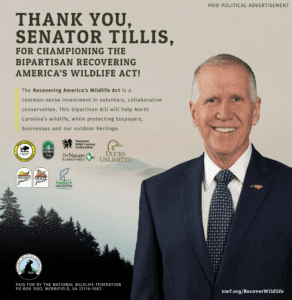Wildlife Policy & Conservation Actions Focus of NCWF Annual Meeting

Wildlife policy and actions to conserve wildlife species and habitats were the focus of North Carolina Wildlife Federation’s annual meeting on Sept. 10, 2022, in Cary.
Manley Fuller, NCWF’s vice president of policy, kicked off the meeting with an overview of Recovering America’s Wildlife Act (RAWA), the most critical wildlife legislation in half a century. N.C. Wildlife Resources Commission (NCWRC) experts also weighed in. NCWRC’s Chief Habitat Conservation Division’s Shannon Deaton discussed Preparing for Recovering America’s Wildlife Act (WAP), the planning tool to help conserve and enhance the state’s full array of fish and wildlife species and their habitats. Eastern Piedmont Habitat Conservation Coordinator Gabriela Garrison highlighted Pollinator Conservation in North Carolina, and Wildlife Action Plan Coordinator Cindy Simpson discussed Plants in the NC Wildlife Action Plan. Lieutenant Chad Arnold addressed RAWA’s impact on wildlife law enforcement.
State Wildlife Action Plans emerged from a mandate by U.S. Congress that each state develops a comprehensive conservation strategy to be eligible for federal funding under the State Wildlife Grants program. Wildlife Action Plans are state – not agency – blueprints updated every 10 years and require public input. North Carolina’s 2015 Wildlife Action Plan will be updated by 2025. Plans may include recreation and education; some states have plants in their action plans, with many others planning to include them.
At-Risk Wildlife and Reasons for Decline
Fuller noted that America’s wildlife are at risk, with one-third of species at risk of extinction, 1,600 species listed under the Endangered Species Act and more than 12,000 species considered as having the most significant conservation need.
Nearly 3 billion birds have disappeared since 1970, including 3 in 4 eastern meadowlarks. About 70 percent of freshwater mussels in the Southeast are extinct or imperiled. And amphibians have declined about 42 percent across the country. In North Carolina, there are 40-plus threatened species, 60-plus endangered species, and 115-plus species of special concern, including the golden-winged warbler, painted bunting and hellbender.
Reasons for the decline in wildlife include habitat loss and degradation, invasive species, disease, climate change and agencies’ inability to address wildlife issues. Recovering America’s Wildlife Act is a proactive conservation solution that will prevent wildlife from becoming endangered in every state.
“We’re talking about $1.39 billion annually. That’s real money dedicated through annual funding to help at-risk wildlife across the country,” Fuller said. “It also includes approximately $24 million per year specifically for North Carolina and $97.5 million for tribes.”
Investing in Wildlife Conservation Saves Species
Fuller also said that investments in wildlife conservation help save imperiled species, citing the bald eagle, Kirtland’s warbler, New England cottontail, pronghorn and wild turkey as conservation successes.
RAWA funds will help support proactive conservation actions and partnerships for species reintroduction, including habitat restoration, land and water acquisition, abundance and distribution surveys, invasive species removal, and disease detection and eradication.
Partnerships extend far beyond state agencies and include technical assistance to public and private entities, governmental entities and conservation NGOs such as NCWF, rare species research at universities, biological monitoring through community scientists and others, and habitat stewardship and acquisition.
“Bipartisan support for Recovering America’s Wildlife Act is good for wildlife, good for taxpayers and good for business,” Fuller said. A Senate vote on the bill is expected soon.
Recovering America’s Wildlife Act House Bill (2773)
194 cosponsors (42 Republicans)
Passed June 2022; bipartisan 231-190
Recovering America’s Wildlife Act Senate Bill (S. 2372)
Heinrich (D-NM) & Blunt (R-MO) Tillis (R-NC)
42 cosponsors (16 Republicans)
NCWF Board of Director Updates
Also at the annual meeting, NCWF bid farewell to outgoing board members Ann Somers and Lloyd ‘Jock’ Tate, who served with distinction and honor during their three terms.
Jennifer Mills, mid-Atlantic director for National Wildlife Federation, swore in new executive officers: Chair Steve Jester, Vice Chair Dr. Wilson Laney, Vice Chair Scott Fletcher, Secretary Dr. Anne Radke and Treasurer Snyder Garrison.


